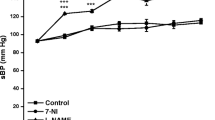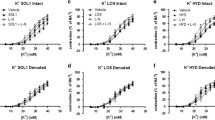Abstract.
Balloon denudation of the rat carotid artery leads to an immediate decrease in β-adrenoceptor-mediated vasodilator response. However, this arterial function becomes significantly enhanced during subsequent formation of neointima with the endothelial cell lining still being absent. It was therefore hypothesized that chronic suppression of endothelium-dependent nitric oxide (NO) synthesis may eventually upregulate the β-adrenoceptor system on vascular smooth muscle. To investigate this hypothesis, male Wistar rats were treated chronically with the L-arginine analogue N G-nitro-L-arginine methyl ester (L-NAME) to inhibit the synthesis of NO (i.e. 15 mg/kg per day or 0.06 mmol/kg per day for 6 weeks p.o.). Prior to the experiments the mean arterial blood pressure (MAP) was significantly elevated in the L-NAME-treated rats (i.e.128.4±3.4 mmHg vs. 100.0±2.9 mmHg, L-NAME vs. control, n=4, P<0.05). The functional properties of the isolated vessel preparations were established by isometric force measurement in a myograph setup, in the absence of L-NAME. The maximal contractile responses to high potassium chloride solution (100 mM), to the α1-adrenoceptor agonist phenylephrine, and to the thromboxane A2-agonist U46619, were not influenced by chronic L-NAME-treatment in the carotid and mesenteric artery preparations. The vasodilator responses to the cholinergic agonist methacholine were significantly impaired in the carotid arteries of L-NAME-treated animals: 30.9±7.9% vs. 64.6±2.0%, P<0.05, L-NAME vs. control, n=10. However, these responses appeared not to be modulated in the mesenteric artery preparations after chronic L-NAME treatment. Separate experiments showed that these responses could be blocked both in the rat carotid and mesenteric artery with L-NAME (10 mM) in vitro. Addition of the NO synthase substrate L-arginine could partially but significantly reverse this blockade. Chronic inhibition of NO synthesis caused significant deterioration of β-adrenoceptor-mediated vasodilator responses. For carotid arteries: E max=36.1±9.4% vs. 65.9±6.0%, P<0.05, L-NAME vs. control, n=5; and pD 2=6.7±0.2 and 7.4±0. 1, respectively, P<0.05, n=5. For mesenteric arteries: pD 2=7.7±0.0 and 8.0±0.0, respectively, P<0.05, n=5. From these data, it may be concluded that chronic L-NAME treatment results in a stable impairment of the endothelium-dependent NO system in the rat carotid but not mesenteric arteries. The stated hypothesis fails as the β-adrenoceptor-induced vasorelaxation of carotid and mesenteric arteries became significantly impaired, rather than enhanced. Taken together, the β-adrenoceptor function in the rat carotid artery is apparently more dependent on endothelial NO synthesis than that in the rat mesenteric artery.
Similar content being viewed by others
Author information
Authors and Affiliations
Additional information
Electronic Publication
Rights and permissions
About this article
Cite this article
Heijenbrok, F., Mathy, MJ., Pfaffendorf, M. et al. The influence of chronic inhibition of nitric oxide synthesis on contractile and relaxant properties of rat carotid and mesenteric arteries. Naunyn-Schmied Arch Pharmacol 362, 504–511 (2000). https://doi.org/10.1007/s002100000254
Received:
Accepted:
Issue Date:
DOI: https://doi.org/10.1007/s002100000254




